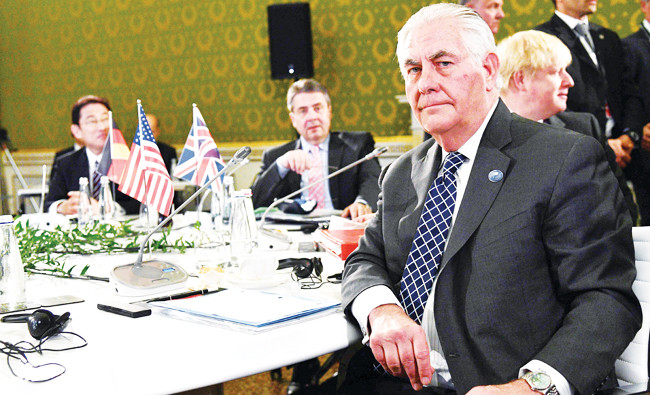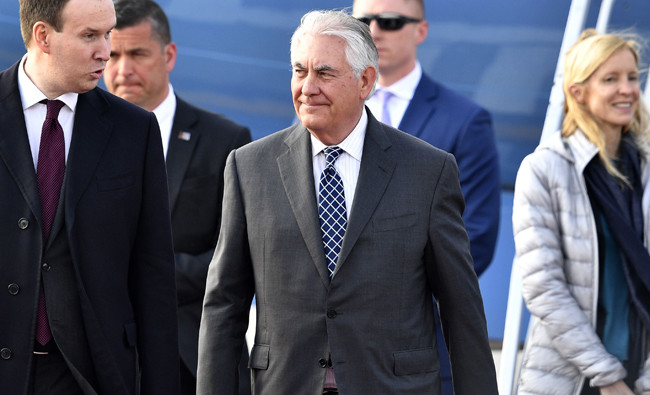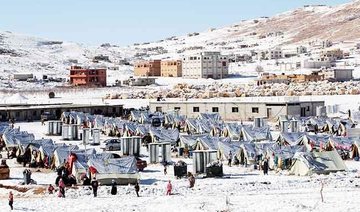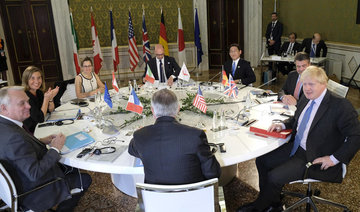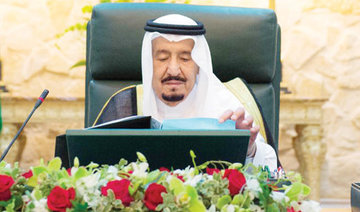JEDDAH/LUCCA, Italy: US Secretary of State Rex Tillerson issued an ultimatum to Russia on Tuesday: Side with the US and like-minded countries on Syria, or embrace Iran, militant group Hezbollah and embattled Syrian leader Bashar Assad.
As he embarked on a trip to Moscow following urgent meetings in Italy with top diplomats, Tillerson said it was unclear whether Russia had failed to take seriously its obligation to rid Syria of chemical weapons, or had merely been incompetent. But he said the distinction “doesn’t much matter to the dead.” He said: “We cannot let this happen again.”
Speaking to reporters, he said: “We want to relieve the suffering of the Syrian people. Russia can be a part of that future and play an important role. Or Russia can maintain its alliance with this group, which we believe is not going to serve Russia’s interests longer term.”
He added: “It is clear to all of us that the reign of the Assad family is coming to an end … but the question of how that ends and the transition itself could be very important in our view to the durability, the stability inside of a unified Syria.”
He said the cease-fire talks that Russia and Iran have helped broker in the Kazakh capital, Astana, could generate momentum toward broader talks about a political transition — if the Astana talks succeed in creating a durable cease-fire. The resulting political talks would take place under the auspices of the UN process in Geneva.
“To date, Astana has not achieved much progress,” Tillerson said.
Tillerson spoke after a meeting of the “like-minded” countries was hastily arranged on the sidelines of the summit of the Group of Seven industrialized economies in Italy, days after the US for the first time launched airstrikes against Assad’s forces.
Tillerson said his hope is that Assad will not be part of Syria’s future.
“To be clear, our military action was a direct response to the Assad regime’s barbarism. The United States’ priority in Syria and Iraq remains the defeat of ISIS (Daesh),” he added.
G-7 foreign ministers reached no agreement on a British suggestion that sanctions be tightened against Syria and Russia, Italy’s foreign minister said.
British Foreign Secretary Boris Johnson had said ahead of the G-7 meeting that he wanted to discuss imposing fresh sanctions over last week’s alleged chemical weapons attack in an opposition-held area by Assad’s air force.
Meanwhile, Turkey said that tests proved the deadly nerve agent sarin was used in the chemical attack. “It has been identified that sarin gas was used,” Turkish Health Minister Recep Akdag said, quoted by state-run news agency Anadolu.
The results came from analysis of blood and urine samples of the victims who were brought to Turkey for treatment. Three of them died in hospital.
Oubai Shahbandar, a Syrian-American analyst and fellow at the New America Foundation’s International Security Program, was not surprised by Turkey’s confirmation of the use of sarin gas in the chemical attack on Khan Sheikhun.
“No credible analyst believed that the Assad regime would voluntarily get rid of its entire chemical weapon arsenal,” he told Arab News.
“There has been evidence since 2014 that the regime maintained a small covert stockpile of nerve agents and had the ability to produce more.”
He said Ankara has sent an important message to Moscow. “Russia continues to deny that the Assad regime is responsible for using sarin gas,” so Turkey’s confirmation “is significant,” said Shahbandar.
“Only one side in the conflict in Syria has the ability to make this deadly weapon, and that’s the regime.”
On Turkey’s demand to declare and try Assad as a war criminal, Shahbandar said: “It’s difficult to see how a political transition in Syria is feasible without justice and accountability for the victims of Assad’s genocide.”
He added: “There are ongoing efforts to bring him to trial in the International Criminal Court for war crimes. The drive to bring Assad to justice is understandable when one looks at the pictures of the victims of the chemical attacks, and the thousands of victims of his torture chambers, barrel bombs and death facilities.”
Shahbandar said he expects more US military strikes. “The Trump administration is studying multiple plans and options on the way forward. Future military strikes will likely take place. The Assad regime has proven itself to be quite obstinate, and even though the Shayrat strikes were a powerful message, Assad will likely attempt to push his luck even further.”
Shahbandar said Moscow and Damascus were severely underestimating Trump “if they think he’ll hesitate to hit Assad again.”
Shahbandar added: “The message from the White House has been loud and clear: Assad is a criminal and is bringing destruction to Syria. Washington is offering real leadership in dealing with the Syrian conflict. It’s a major game-changer.”
WITH INPUT FROM AP, AFP, REUTERS


